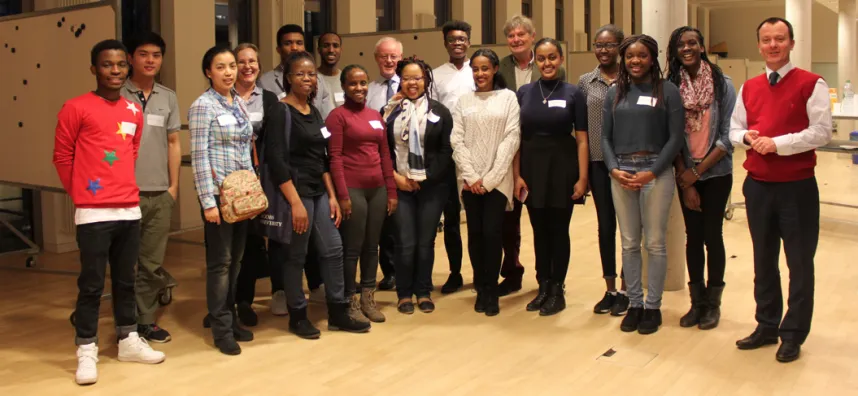Africa: Development opportunities through education
April 10, 2017
In many countries south of the Sahara, there is a lack of fundamental things, such as democratic stability, a functioning system of administration, or a reliable infrastructure. If Africa can succeed in solving these problems, education can offer opportunities for development. On that the African students at Jacobs University in Bremen agree. At a workshop in cooperation with ESSA – Education Sub Sahara Africa , they discussed the future of the continent.
All the results of the workshop will be incorporated in the work of the ESSA initiative, which is supported by the Robert Bosch Foundation. ESSA works as a virtual center, which is committed to raising the education standards by joining up, informing, inspiring, focusing and increasing impact for everyone investing in education in Sub Saharan Africa and by building the “Go to” Knowledge hub to gather, order, analyse and communicate relevant data and research findings
From Ethiopia to Ghana to Kenya and on to Zimbabwe and Tanzania: Jacobs University students from 12 African nations reported on problems in the educational systems in their home countries and discussed approaches to a solution. At Jacobs University in Bremen, about ten per cent of the young people are Africans. Foundations assume the entire financing for needy students – from the flight, to a laptop, to spending money.
The experiences of the Bremen students are very valuable. That is why ESSA Chairman Patrick Dunne and Dr. Olaf Hahn, the ESSA Director and Senior Vice President at the Robert Bosch Foundation have initiated and carried out the workshop. “For many problems there are no simple, fast solutions,” notes Dr. Tanja Woebs of Jacobs University, who organized the workshop in Bremen. In the African countries south of the Sahara, current estimates are that about 30 million children do not go to school.
And where there are schools, learning is difficult: The students – asked to imagine they were the Education Minister of their home countries and to compose a “Students’ Manifesto for Education in Sub Saharan Africa - report overfilled classrooms and a lack of teachers, inadequate technical equipment, and buildings in poor condition. In many areas, there are frequent power failures. On the other hand, in urban centers with stable power and Internet connections, the students see opportunities in e-learning. Many young people today could be educated cost-effectively through online seminars and access to virtual libraries – that is the hope.
The students call for a rethinking in the assessment of education: In many countries, learning is not viewed as an investment. Only about five per cent of a given year even go to college. The prospects in the labor market are often so poor that a lengthy education does not pay off; in the worst case, graduation is followed by unemployment. In addition, quota systems at universities were also discussed. Because the lecture halls and seminar rooms are still filled with distinctly more young men than women.
The challenges will intensify in the coming years due to population growth. According to estimates by the German Foundation on World Population, the population south of the Sahara is expected to triple by the end of the 21st century. These many young people are the potential of Africa. But they need an opportunity to develop their capabilities and to contribute those skills to the development of the society. Whether that succeeds will decide the future of Africa – good education is an important precondition.
About Jacobs University:Jacobs University is a private, independent, English-language university in Bremen. Young people from all over the world study here in preparatory, Bachelor, Master, and PhD programs. Internationality and transdisciplinarity are special features of Jacobs University: research and teaching don’t just pursue a single approach, they address issues from the perspectives of multiple disciplines. This principle makes Jacobs graduates highly sought-after new talents who successfully strike out on international career paths.